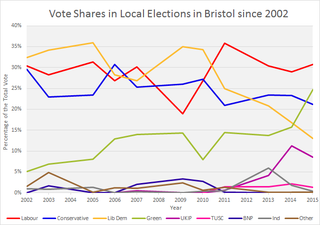
Bristol is a unitary authority and ceremonial county in England. Until 1 April 1996 it was a non-metropolitan district in Avon. Since 2012 it has also had a directly elected mayor.

Bristol City Council is the local authority of Bristol, England. The council is a unitary authority, and is unusual in the United Kingdom in that its executive function is controlled by a directly elected mayor of Bristol. Bristol has 35 wards, electing a total of 70 councillors.
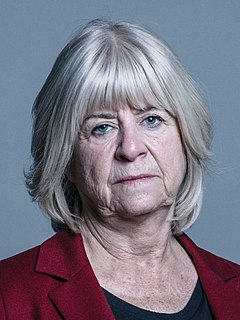
Barbara Lilian Janke, Baroness Janke is a British teacher and politician. She was the Liberal Democrat leader of Bristol City Council from 2005 to 2007 and from 2009 to 2012. She has been Councillor for Clifton ward since 1995. She was leader of the Liberal Democrat group since 1997, with a break from 2007 to 2008. In August 2014 Cllr Janke was named as one of six new Liberal Democrat working peers.

The city of Bristol, England, is a unitary authority, represented by four MPs representing seats wholly within the city boundaries. As well as these, Filton and Bradley Stoke covers the northern urban fringe in South Gloucestershire and the north eastern urban fringe is in the Kingswood constituency. The overall trend of both local and national representation became left of centre, favouring the Labour Party and Liberal Democrats during the latter 20th century, but there was a shift to the right in the 2010 general election. The city has a tradition of local activism, with environmental issues and sustainable transport being prominent issues in the city.

The 1988 Bristol City Council election took place on 5 May 1988 to elect members of Bristol City Council in England. This was on the same day as other local elections. One third of seats were up for election. This was the first election following the merger of the Liberal Party and SDP to form the Social & Liberal Democrats. There were also several candidates representing the continuing SDP. There was a general small swing to Labour.

The 1990 Bristol City Council election took place on 3 May 1990 to elect members of Bristol City Council in England. This was on the same day as other local elections. One third of seats were up for election. There were by-elections in Brislington East and Easton. As Easton also had an election in the usual schedule, 2 seats were elected in that ward. There was a significant swing against the Liberal Democrats, largely as a result of the post-merger chaos that the party suffered.
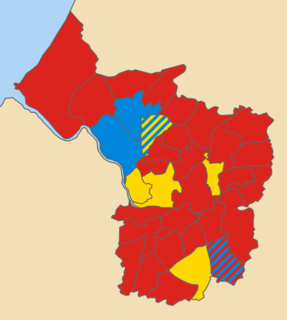
The 1995 Bristol City Council election took place on 4 May 1995 with all seats being up for election, in preparation for Bristol City Council becoming a Unitary Authority following the abolition of Avon County Council. The same ward boundaries were used, however these are elections to a new authority and cannot be considered gains or losses compared to previously held seats.
Steve Comer is a former leader of the Liberal Democrats on Bristol City Council in Bristol, England. He was Councillor for Eastville ward from 2005 to 2013, having previously served as Councillor for the adjacent Easton ward (1983-7). He lost by a single vote to a Labour candidate in 2013.
Bristol City Council is a unitary authority and ceremonial county in England. Originally formed on 1 April 1974 as a non-metropolitan district as a result of the Local Government Act 1972. It was envisaged that Bristol would share power with Avon County Council, an arrangement that lasted until 1996 when it was made into a unitary authority by the Local Government Commission for England, which abolished the county of Avon and gave Bristol City Council control of Avon Council's responsibilities.
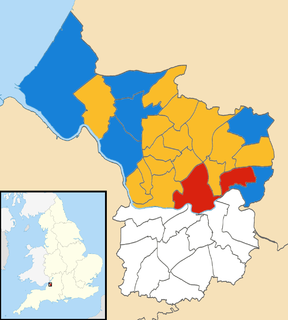
The 2009 Bristol City Council elections were held on Thursday 4 June 2009, for 23 seats, that being one-third of the total number of councilors. The Liberal Democrats who had been leading a minority administration, won an overall majority of the council, the first time the party had achieved this on Bristol City Council. The Liberal Democrats were defending 11 seats, the Labour Party 10 and the Conservatives 2.

The 2010 Bristol City Council elections were held on Thursday 6 May 2010, for 23 seats, that being one third of the total number of councillors. The Liberal Democrats, who had won overall control of the council in 2009, increased their majority to six seats.
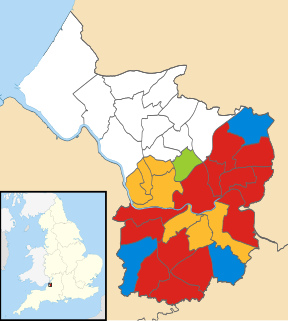
The 2011 Bristol City Council elections were held on Thursday 5 May 2011, for 24 seats, that being one third of the total number of councillors. The Liberal Democrats, who had won overall control of the council in 2009 and increased their majority in 2010, experienced a drop in support and lost 5 seats; 4 to the Labour Party and 1 to the Green Party, which gained its second ever council seat in Bristol. This meant that the Lib Dems no longer had a majority on the council. However, they continued to run the council, relying on opposition groups to vote through any proposal.
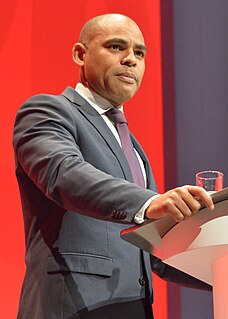
The Mayor of Bristol is the head of Bristol City Council. The Mayor is an elected politician who, along with the 70 members of Bristol City Council, is responsible for the strategic government of the city of Bristol, England. The role was created after a local referendum held on 3 May 2012, which followed the passage of the Localism Act 2011. 41,032 voted for an elected mayor and 35,880 voted against, with a turnout of 24%. An election for the new post was held on 15 November 2012.
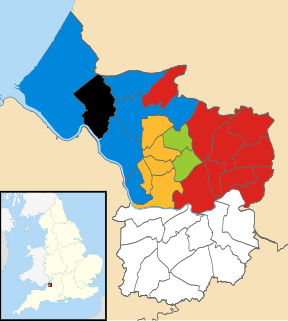
Elections for one third of Bristol City Council were held on 2 May 2013 as part of the United Kingdom local elections, 2013. No party gained overall control.
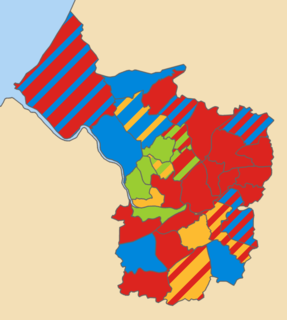
The 2016 Bristol City Council election took place on Thursday 5 May 2016, alongside nationwide local elections. Following a boundary review, the number of wards in the City was reduced to 34, with each electing one, two or three Councillors. The overall number of Councillors remained 70, with all seats are up for election at the same time. Elections would then be held every 4 years.

The 1999 Bristol City Council election took place on 6 May 1999, on the same day as other local elections. All seats were up for election due to boundary changes, with each ward electing 2 councillors. The total number of seats on the council increased by 2 due to the creation of a new ward: Clifton East.

The 2002 Bristol City Council election took place on 2 May 2002, on the same day as other local elections. Despite suffering some losses, the Labour Party managed to retain a slim majority.

The 2003 Bristol City Council election took place on 1 May 2003, on the same day as other local elections in the UK. The Labour Party made a number of losses, mainly to the Liberal Democrats, and lost overall control of the council. Loses included Council leader Diane Bunyan, who lost her Windmill Hill seat to the Liberal Democrats. This year also saw elections contested by the new Bristolian Party, founded by the local 'scandal sheet' The Bristolian, though they failed to win any seats.

The 2007 Bristol City Council election took place on 3 May 2007, on the same day as other local elections. The Liberal Democrats lost 2 seats to Labour, but remained the largest party on the Council. No party gained overall control.

The 2017 mayoral election in Lancaster, Pennsylvania, was held on November 7, 2017, and resulted in the election of Democratic Party nominee Danene Sorace to her first term as mayor.


















